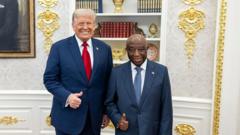Six months into his term, President Trump's haphazard trade policy is casting uncertainty across the global market, disrupting long-standing trading relationships.
Trump's Tariff Tactics Leave Global Trade in Turmoil

Trump's Tariff Tactics Leave Global Trade in Turmoil
Amid chaotic negotiations and unexpected announcements, global partners are left guessing Trump's next move on trade tariffs.
In the wake of a rapid series of tariff announcements, President Trump's administration has been marked by unpredictability. Following his April unveiling of tariff figures at the White House, a frenzied period of negotiation ensued, but the clarity many expected soon evaporated. Mr. Trump's erratic policymaking has raised confusion among trading partners, as he has flip-flopped on deadlines, abruptly dismantled talks at critical moments, and linked tariffs to unrelated matters, such as Brazil's political dynamics and Canada's fentanyl distribution.
Airlangga Hartarto, Indonesia's economic affairs minister, highlighted that engaging in talks with the U.S. had become akin to navigating a "labyrinth," with countries frequently returning to square one. This chaotic atmosphere is stifling corporate and national planning efforts, as the global trade environment teeters on the edge of disorder. Carsten Brzeski, macroeconomics lead at ING Bank in Germany, described the prevailing uncertainty as "poison" for the world economy, indicating that meaningful agreements are far from being achieved.
Gone is the aspiration of finalizing 90 trade deals in 90 days, a promise made by Trump back in April. Instead, the U.S. has entered into mostly minimalist agreements with major economic players such as China, while dispatching blunt and uniform communications regarding new tariffs scheduled to take effect on August 1. As this chaos unfolds, those involved in global commerce are left grappling with an unpredictable landscape.
Airlangga Hartarto, Indonesia's economic affairs minister, highlighted that engaging in talks with the U.S. had become akin to navigating a "labyrinth," with countries frequently returning to square one. This chaotic atmosphere is stifling corporate and national planning efforts, as the global trade environment teeters on the edge of disorder. Carsten Brzeski, macroeconomics lead at ING Bank in Germany, described the prevailing uncertainty as "poison" for the world economy, indicating that meaningful agreements are far from being achieved.
Gone is the aspiration of finalizing 90 trade deals in 90 days, a promise made by Trump back in April. Instead, the U.S. has entered into mostly minimalist agreements with major economic players such as China, while dispatching blunt and uniform communications regarding new tariffs scheduled to take effect on August 1. As this chaos unfolds, those involved in global commerce are left grappling with an unpredictable landscape.




















